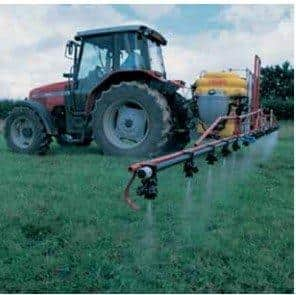The ‘miracle’ weed killer
and live on Freeview channel 276
The arrival of spring heralds a flurry of activity as farmers rush to get fields ploughed and new crops established while the weather allows.
Hopefully by the time you are reading this, most of the cereal crops will already have been sown and potato planting will be well underway.
Once sowing, or planting is complete, the waiting begins.
Advertisement
Advertisement


Soon a handful of green shoots will start to appear as the new crop emerges slowly, and in a short time the brown earth suddenly becomes a carpet of green.
Unfortunately, at this stage, some less desirable shoots are also beginning to appear – the weeds.
Modern farming possesses a vast array of herbicides to help weed control.
It often amazes me how they tackle such a wide range of species while leaving the target crop unharmed.
However it hasn’t always been this easy.
Advertisement
Advertisement
Chemical weed killers were only discovered as recently as the late 1800s, and it wasn’t until 1945, with the introduction of 2,4-D, that the era of selective ‘miracle’ weed killers began.
For centuries, the only option to tackle troublesome weeds was by hand, or in certain crops, by using a horse-drawn hoe - tedious, back-breaking work, rewarded only by the prospect of a better harvest.
In Matthew’s gospel, Jesus tells a parable about a farmer who faces a serious weed problem.
Having been diligent to source clean, healthy wheat seed, an enemy comes along after the seed is sown and scatters weed seeds through his crop.
Advertisement
Advertisement
The farmer only discovers this after the wheat has emerged, with weeds springing up threatening to choke the crop.
Eager to ensure the harvest is not a failure, the farm workers ask if they should take action by pulling out the weeds. But the farmer says no “‘…lest in gathering the weeds you root up the wheat along with them. Let both grow together until the harvest, and at harvest time I will tell the reapers, Gather the weeds first and bind them in bundles to be burned, but gather the wheat into my barn’.” (Matthew 13:29-30).
Jesus goes on to explain that in this parable He is the farmer, and that the harvest is a picture of His second coming, when all people will stand before Him in judgement.
On that day, He will gather His followers (the wheat) into His heavenly barn, to be with Him in His glorious presence for eternity.
Advertisement
Advertisement
Those who have not accepted God’s gift of grace in Jesus however (the weeds) will face eternal punishment for their sin.
While the certainty and conclusiveness of that final harvest is clear, the great news of this parable is the patient waiting of the Farmer.
The harvest has not yet begun because Jesus is giving us all an opportunity to become like wheat. As 2 Peter 3:9 explains, “The Lord is not slow to fulfil his promise as some count slowness, but is patient towards you, not wishing that any should perish, but that all should reach repentance.”
Those first ‘miracle’ weed killers were an amazing development for farming, and their benefits for food production in the last 80 years have been immense.
Advertisement
Advertisement
But today we all have the opportunity to experience an even greater miracle, one that will impact our lives both now and for eternity.
Why not put your trust in Jesus today, and look forward to a bountiful and blessed harvest when He returns.
Ronald Annett works for a local animal feed company and helps out on the family farm in the shadow of the Mourne Mountains. He is a member of Mourne Presbyterian Church in Kilkeel, County Down.
If you would like to talk to someone about any of the issues raised in this article, please email Rev Kenny Hanna, PCI’s Rural Chaplain at [email protected] or call him on 07938 488 372.